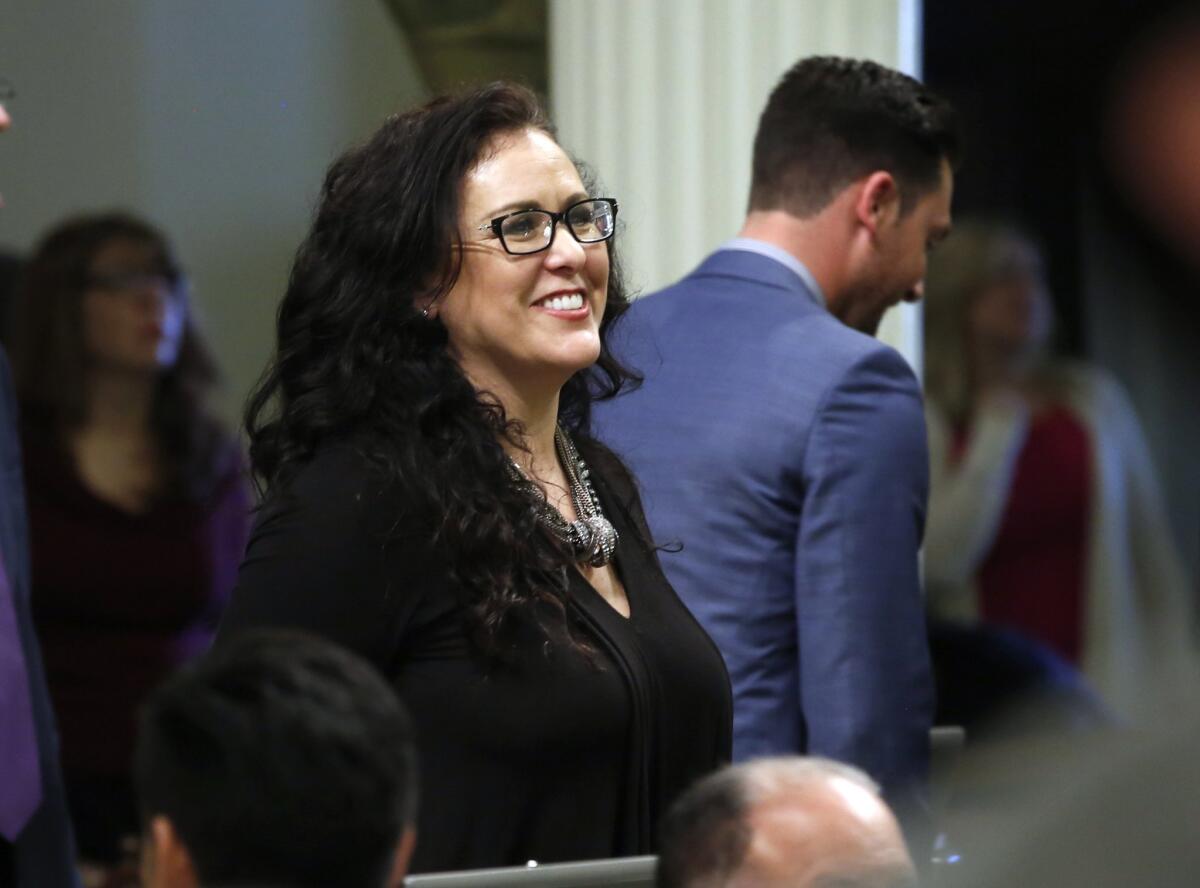Court’s move to give two nonprofits access to students’ personal data ignites privacy debate

“I was literally out of my mind,” said Assemblywoman Lorena Gonzalez, a Democrat. Above, Gonzalez in the Assembly last month.
- Share via
reporting from SAN DIEGO — School districts throughout the state are warning that students’ personal data will soon be accessed by two nonprofit organizations as part of a federal court case involving special education services, sparking an outcry from parents and lawmakers over privacy rights.
The data — including Social Security numbers, mental health records and home addresses — has been sought by the California Concerned Parents Assn. and the Morgan Hill Concerned Parents Assn., which is suing the state Department of Education.
The groups allege that the state is not providing a free and appropriate public education to children with disabilities, as is required by law.
School districts began notifying parents this week that the data would be provided to comply with a recent court ruling in the case.
“I was literally out of my mind,” said Assemblywoman Lorena Gonzalez, a Democrat who serves the 80th District in southern San Diego. She learned of the court ruling over the weekend.
“They don’t need all of this information.”
Parents can object to the data dump by April 1 via the Education Department’s website, cde.ca.gov, or the California Concerned Parents Assn.’s website at californiaconcernedparents.org.
Peter Tira, an Education Department spokesman, said it’s unclear whether objecting would prevent a student’s data from being released.
“It’s up to the court to make that determination,” he said. “Nothing has been turned over.”
Representatives of the California Concerned Parents Assn. could not be reached for comment, but a statement on the group’s website said the nonprofit is “very concerned about the privacy of all students in the state.”
“We would like parents to understand that we had offered to mediate a settlement with the California Department of Education many times and have offered to receive the information” with fake names, the statement said. “The attorneys for the CDE refused, which forced the judge to make this ruling.”
In her ruling, U.S. District Judge Kimberly Mueller in Sacramento imposed several measures designed to protect the information, including that fewer than 10 people be allowed to search student records and that attorneys and consultants will have access only to records through judicial overseers.
Still, parents, administrators and state officials said that’s not enough.
Gonzalez joined Assemblywoman Melissa Melendez (R-Lake Elsinore) and Assemblyman Mike Gatto (D-Glendale) to introduce legislation designed to ensure that personal information such as Social Security numbers are protected at the school district level.
“It’s time to clean up some of this stuff,” she said.
The San Diego Unified School District has posted information on its website about the order and how it might affect the district’s 128,000 students, spokeswoman Linda Zintz said.
“At this point, we’re asking schools to let parents know about the ruling,” she said. “We’ll look at other strategies to make sure all parents are informed.”
Sue Kroncke, director of special education with the Escondido Union High School District, said officials are trying to determine who must comply with the ruling and how it will be handled.
“We are still trying to make sense of this,” said Kroncke, adding that uncertainty remains on whether the order affects all 8,000 students in her school district or only the 800 students who are classified as having special education needs.
She said that she previously thought that such data was protected by the Family Educational Rights and Privacy Act of 1974.
“We operate in good faith that we will keep information private,” she said. “This ruling was quite a surprise to all of us in education.”
Twitter: @patmaio
Maio writes for the San Diego Union-Tribune.
ALSO
Inside the fight against California’s charter schools
Despite new requirements, L.A. Unified’s projected graduation rate soars
LADWP Science Bowl pits 25 schools in a battle of science, math and technology
More to Read
Sign up for Essential California
The most important California stories and recommendations in your inbox every morning.
You may occasionally receive promotional content from the Los Angeles Times.













